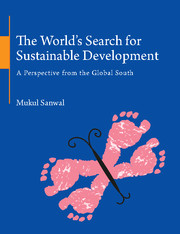Book contents
- Frontmatter
- Dedication
- Contents
- Preface
- Acknowledgments
- Abbreviations
- INTRODUCTION
- 1 Social Dimension of Sustainability
- CONSUMPTION IN AN UNEQUAL WORLD: FRAMING INTERNATIONAL COOPERATION
- CLIMATE POLICY: GLOBAL TO NATIONAL
- 6 Political Origins of Climate Policy
- 7 Questions on the Framework
- 8 Burden Shifting Rather than Burden Sharing
- 9 Development of a Shared Vision
- 10 The Middle Class and Global Ecological Limits
- 11 The New Climate Regime
- SUSTAINABLE DEVELOPMENT: NATIONAL TO GLOBAL
- CONSUMPTION IN A MORE EQUAL WORLD: SHAPING SOCIETAL FUNCTIONS
- GEOPOLITICS TO GEOECONOMICS: RURAL–URBAN DIVIDE, RATHER THAN BETWEEN COUNTRIES
- THE ASIAN CENTURY
- Index
7 - Questions on the Framework
from CLIMATE POLICY: GLOBAL TO NATIONAL
Published online by Cambridge University Press: 18 December 2015
- Frontmatter
- Dedication
- Contents
- Preface
- Acknowledgments
- Abbreviations
- INTRODUCTION
- 1 Social Dimension of Sustainability
- CONSUMPTION IN AN UNEQUAL WORLD: FRAMING INTERNATIONAL COOPERATION
- CLIMATE POLICY: GLOBAL TO NATIONAL
- 6 Political Origins of Climate Policy
- 7 Questions on the Framework
- 8 Burden Shifting Rather than Burden Sharing
- 9 Development of a Shared Vision
- 10 The Middle Class and Global Ecological Limits
- 11 The New Climate Regime
- SUSTAINABLE DEVELOPMENT: NATIONAL TO GLOBAL
- CONSUMPTION IN A MORE EQUAL WORLD: SHAPING SOCIETAL FUNCTIONS
- GEOPOLITICS TO GEOECONOMICS: RURAL–URBAN DIVIDE, RATHER THAN BETWEEN COUNTRIES
- THE ASIAN CENTURY
- Index
Summary
Market-based approaches are not leading to a technological transformation
It is now being recognized that the global rules – institutional architecture, system of global agreements, organizations and policy approaches – we have in place have not proved effective in making the transition to a low-carbon economy, and the United Nations has pointed out, in a recent report to the Economic and Social Council, that sustainable development is unattainable within the existing international frameworks [United Nations, 2011].
Under the current framework for international cooperation around burden sharing, the corollary of financial transfers to developing countries is putting a price on greenhouse gas emissions for sharing marginal costs of measures for meeting multilaterally agreed emission reduction targets in developed countries. Environment policies in industrialized countries have been directed at specific impacts, imposing additional costs, and have met with variable success because, for example, mitigation actions may reduce emissions but do not necessarily stimulate a transformation of industrial policy. Setting the price signal and emissions cap at the right level has proven politically difficult, and the effectiveness of the European Trading Scheme in promoting low-emissions investment is being questioned. Japan has concluded that an emissions trading scheme will hamper investments in key industries and that forcing companies to accept allocated emission caps, as in Europe because of its special circumstances of countries at different levels, would not work in Japan. The United States has also deferred a discussion on a ‘cap and trade’ system, as well as economy-wide emissions reduction commitments.
Modifying longer term trends in consumer behaviour by setting a price on carbon has not been successful anywhere. Energy demand is quite inelastic, and balancing between the levels of the price, incentive for innovation and acceptance by the public has not been easy. Economic theory suggests that the marginal cost of emissions should be equal to the marginal cost of the environmental damage, and these estimates range from $15/ton to $300/ton of carbon, while the average historical price of carbon credits is less than $6, and declined to less than $5 in 2013. The uncertainty, extent and timing of damage lead to subjective pricing where public goods are concerned.
- Type
- Chapter
- Information
- The World's Search for Sustainable DevelopmentA Perspective from the Global South, pp. 124 - 130Publisher: Cambridge University PressPrint publication year: 2015

